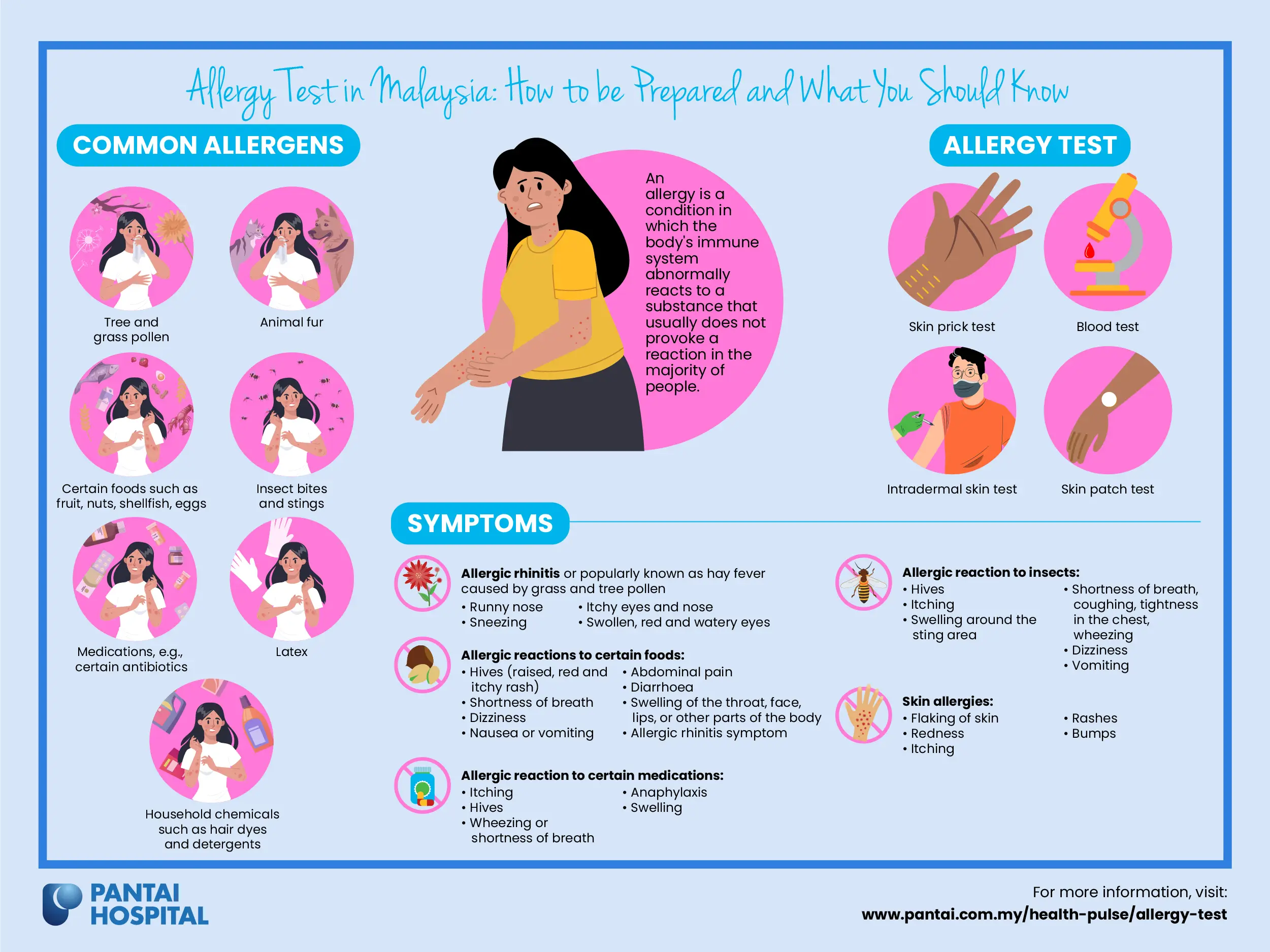Topics
What is an allergy?
An allergy is a condition in which the body's immune system abnormally reacts to a substance that usually does not provoke a reaction in the majority of people.
An allergy is relatively common, and some people tend to be more susceptible to allergies. Both hereditary and environmental factors contribute to allergy development. Specific allergies are not hereditary, but the likelihood of developing an allergy considerably increases if a family member is allergic.
What are the common allergens?
Allergens are substances that trigger allergic responses.
Common allergens include the following:
- Tree and grass pollen
- Animal fur
- Certain foods such as fruit, nuts, shellfish, eggs
- Insect bites and stings
- Medications, e.g., certain antibiotics
- Latex
- Household chemicals such as hair dyes and detergents
What are the symptoms of allergy?
An allergy can affect your digestive system, skin, nasal passages, airways, and sinuses. Allergy symptoms can significantly vary depending on the allergen involved. Allergic reactions can range from mild to severe. A life-threatening reaction known as anaphylaxis could happen in severe cases.
Below is the list of symptoms of allergies based on the type of allergens.
Allergic rhinitis or popularly known as hay fever caused by grass and tree pollen:
- Runny nose
- Sneezing
- Itchy eyes and nose
- Swollen, red and watery eyes
- Hives (raised, red and itchy rash)
- Shortness of breath
- Dizziness
- Nausea or vomiting
- Abdominal pain
- Diarrhoea
- Swelling of the throat, face, lips, or other parts of the body
- Allergic rhinitis symptom
- Itching
- Hives
- Wheezing or shortness of breath
- Anaphylaxis
- Swelling
- Hives
- Itching
- Swelling around the sting area
- Shortness of breath, coughing, tightness in the chest, wheezing
- Dizziness
- Vomiting
- Flaking of skin
- Redness
- Itching
- Rashes
- Bumps
What is an anaphylaxis?
Symptoms of a severe allergic reaction (anaphylaxis) can develop suddenly and rapidly.
Often, the initial symptoms of anaphylaxis are identical to those listed above and might result in:
- Breathing difficulties
- Swollen mouth and throat
- Chest tightness
- Dizziness
- Loss of consciousness
Anaphylaxis is a life-threatening condition that requires immediate medical attention. It can be fatal if it goes untreated. If you or someone you know appears to be suffering from anaphylaxis, call for an ambulance immediately.

What is an allergy test?
An allergy test is conducted to investigate the type of allergen an individual has reactions to.
The tests that can be performed include:
- Skin prick test
- In a skin prick test, droplets of allergens are placed on your forearm
- A medical device is used to gently prick the area
- If an itchy, red bump emerge on the skin within 15 minutes, you are allergic to the substance
- Blood test
- In place of or in addition to skin prick testing, blood tests may be used to aid in diagnosing common allergies
- Particular allergens are added to the blood, and the level of antibodies produced by your immune system is evaluated
- You are likely to be allergic to the substance if large amounts of antibodies are produced for a particular allergen
- Intradermal skin test
- A small amount of allergen will be injected into the skin
- If the injected area shows any reaction, you have an allergy
- Skin patch test
- Allergens applied to adhesive patches are placed on the skin
- The patches are reviewed after the 48th and 96th hour of placing them
- Swimming and other activities that generate a lot of perspiration should be avoided during this period
- When you return to the doctor's office, the patches are removed
- The patch location may be irritated, which could indicate an allergy
FAQs on allergy tests
- Does an allergy test hurt?
The majority of individuals do not find the tests to be extremely unpleasant, although it can be a bit uncomfortable. Nevertheless, it is a highly safe procedure.
- Can a blood test detect allergies?
Blood tests are the most effective way to detect allergies. Particular allergens are added to the blood, and the level of antibodies produced by your immune system is evaluated. If large amounts of antibodies are produced for a particular allergen, you are likely to be allergic to the substance.
- Does anyone feel sick after allergy testing?
The commonly known side effect is the test site's redness, swelling or itching.
Most symptoms are temporary and will resolve within a few hours after the test. However, if the allergic reaction remains beyond the expected hours, expert medical help is needed.
- What is the most common type of allergens?
- Tree and grass pollen
- Animal fur
- Certain foods such as fruit, nuts, shellfish, eggs
- Insect bites and stings
- Medications (certain antibiotics)
- Latex
- Household chemicals such as hair dyes and detergents
- Can I eat before an allergy test?
Yes, you can have regular food before an allergy test. However, it is better to refrain from any food items that have caused an allergy in the past or those you suspect to have an allergy from.
- Do I need an allergy test?
The test can be taken by anyone. However, an allergy test is highly recommended if you consistently have any of the symptoms mentioned above.
Book an appointment at Pantai Hospitals
Allergy tests are highly beneficial for finding the substance that causes an adverse reaction in your body. While some people have mild allergies, others can even have a life-threatening reaction. Therefore, knowing the exact substances you are allergic to is advisable to stay safe.
Get in touch with us to book an appointment with the Allergy and Immunology specialists at Pantai Hospital for more information on allergy tests.
Pantai Hospitals have been accredited by the Malaysian Society for Quality ina Health (MSQH) for its commitment to patient safety and service quality.












